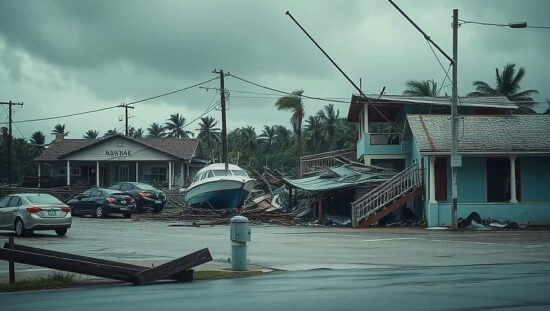The Caribbean nation of Jamaica is reeling from the unprecedented devastation wrought by Hurricane Melissa, a Category 5 storm now being described by the United Nations Office for the Coordination of Humanitarian Affairs (OCHA) as a “storm of the century”. Melissa has intensified rapidly and holds the distinction of being the strongest hurricane ever recorded in Jamaica, rivaling the most powerful Atlantic storms on record and the most intense tropical cyclone globally in 2025.
The storm’s exceptionally low central pressure of 892 millibars – lower than that of Hurricane Katrina in 2005 – is fueling winds reaching sustained speeds of up to 300 kilometers per hour. Melissa’s slow progression across the island is exacerbating the damage, prolonging intense rainfall and increasing the risk of catastrophic flash floods and landslides, especially in mountainous regions where up to a meter of rain is anticipated. Coastal communities face the threat of storm surges reaching four meters, with some areas already reporting inundation, compounded by warnings regarding displaced crocodiles.
Meteorologists attribute the hurricane’s rapid intensification to extremely warm sea surface temperatures, a phenomenon linked directly to the absorption of heat from anthropogenic climate change – the oceans absorbing approximately 90% of excess heat. This connection is sparking a renewed focus on the escalating risks posed by climate change and highlighting the vulnerability of island nations.
The Jamaican government had implemented evacuation protocols, opening 880 shelters for the island’s 2.8 million inhabitants. Despite these efforts, widespread power outages have already impacted 240,000 households and internet connectivity has been disrupted, hampering communication and assessment efforts. The government’s preparedness and response are now under intense scrutiny, particularly regarding the efficacy of early warning systems and the adequacy of infrastructure to withstand such extreme weather events.
While forecasts suggest Melissa will weaken as it moves toward Cuba, where it is expected to downgrade to Category 3, the storm’s reach is already impacting neighboring nations. Haiti, though technically outside the storm’s direct path, is experiencing flooding from Melissa’s outer bands, with nearly 500 homes already flooded and a further ten severely damaged. The events underscore a pattern of increasingly severe weather events disproportionately impacting vulnerable populations in the Caribbean region, raising uncomfortable questions about international aid and long-term climate resilience strategies. The disaster is sure to fuel a renewed debate surrounding the responsibility of industrialized nations in addressing the root causes of climate change and supporting vulnerable island states in adapting to its increasingly destructive consequences.





